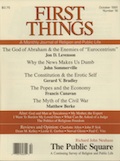I want to be a burden on my family as I die…

Thinking about dying requires thinking about family—what it means “to live in the kind of moral community that deserves to be called a family.” What obligations can we impose on those closest to us during this time of supreme need? What obligations are we willing to accept when a family member is facing their time of supreme need?
Several months ago, Giles Fraser tackled these questions in an article entitled “I want to be a burden on my family as I die, and for them to be a burden on me.” His against-the-grain comments in England’s euthanasia debates generated over a thousand responses—mostly critical, mostly what he expected. Here are a few of Fraser’s thoughts about what it means to be a family, that “moral community that deserves to be called a family.”
I do want to be a burden on my loved ones just as I want them to be a burden on me – it’s called looking after each other. Obviously, I know people are terrified of the indignity of dying and of being ill generally. Having someone wipe our bums, clean up our mess, put up with our incoherent ramblings and mood swings is a threat to our cherished sense of personal autonomy.
But this is where the liberal model of individual self-determination breaks down. For it is when we are this vulnerable that we have little choice but to allow ourselves to be loved and looked after. Lying in a bed full of our own faeces, unable to do anything about it, is when we break with the idea of René Descartes’ pernicious “I think therefore I am”.
No, we are not brains in vats. We are not solitary self-defining intellectual identities who form temporary alliances with each other for short-term mutual advantage. My existence is fundamentally bound up with yours. Of course, I will clean you up. Of course, I will hold your hand in the long hours of the night. Shut up about being a burden. I love you. This is what it means to love you. Surely, there is something extraordinarily beautiful about all of this.
In 1991, Gilbert Meilaender wrote an article with a title remarkably similar to that of Giles Fraser: “I Want to Burden My Loved Ones.” The catalyst for his Fist Things essay was a comment he heard repeatedly at a seminar on end-of-life planning: “I don’t want to be a burden to my children.” This comment, in all its various forms, prompted Meilaender to examine more closely what it means to be a family.
Is this not in large measure what it means to belong to a family: to burden each other—and to find, almost miraculously, that others are willing, even happy, to carry such burdens? Families would not have the significance they do for us if they did not, in fact, give us a claim upon each other. At least in this sphere of life we do not come together as autonomous individuals freely contracting with each other. We simply find ourselves thrown together and asked to share the burdens of life while learning to care for each other. We may often resent such claims on our time and energies. We did not, after all, consent to them. (Or, at least, if we want to speak of consent, it will have to be something like that old staple of social-contract theorists, tacit consent.)
It is, therefore, understandable that we sometimes chafe under these burdens. If, however, we also go on to reject them, we cease to live in the kind of moral community that deserves to be called a family. Here more than in any other sphere of life we are presented with unwanted and unexpected interruptions to our plans and projects. I do not like such interruptions any more than the next person; indeed, a little less, I rather suspect. But it is still true that morality consists in large part in learning to deal with the unwanted and unexpected interruptions to our plans. I have tried, subject to my limits and weaknesses, to teach that lesson to my children. Perhaps I will teach it best when I am a burden to them in my dying.
Thinking about dying requires thinking about family!
Giles Fraser’s article, “I want to be a burden on my family as I die, and for them to be a burden on me,” appeared in the Guardian (May 2013) and can be found here. First Things published Gilbert Meilaender’s “I Want to Burden My Loved Ones” essay in 1991. It can be found here.


 September 23, 2013
September 23, 2013 







Comments are closed.